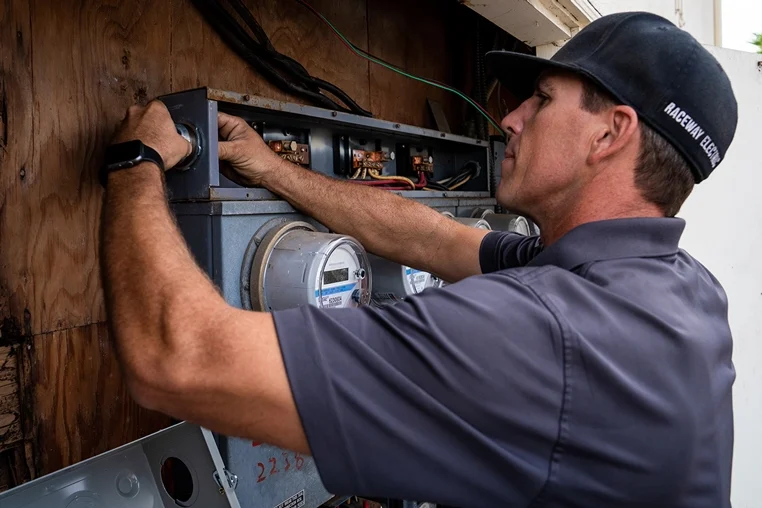Electrician Licensing
georgia Electrician: How to get certified and licensed in GA
Electrician Licensing
Georgia electrician license:
Everything you need to know
Licensed electricians in Georgia are responsible for installing, repairing, and maintaining electrical equipment for residential and commercial properties. The Bureau of Labor Statistics projects the electrical industry will grow by 8% by 2026.
If your goal is to pursue a career in the electrical industry, now is the perfect time. Read this guide to learn how to apply for your Georgia electrical license.
Does Georgia require an electrical license?
All commercial and residential electrical work in Georgia must be completed by a licensed electrician.
What are the different types of electrical licenses in Georgia?
The different types of electrical licenses in Georgia are:
- Electrical Contractor Class I
- Electrical Contractor Class II
Georgia electrical contractor class I licensees are authorized to maintain, install, alter, and repair electrical equipment, control systems, and electrical wiring for single-phase electrical installations. Applicants for this license must:
- Be at least 21 years old
- Pass an examination
- Be approved to sit for the electrical exam
- Possess a high school diploma or GED
- Have at least four years of electrical work experience
Georgia electrical contractor class II licensees are authorized to maintain, install, and repair electrical equipment, control systems, and electrical wiring. Class II licensees are authorized to perform electrical jobs of any amount and size. Applicants must:
- Be at least 21 years old.
- Pass an examination.
- Be approved to sit for the electrical exam.
- Have a high school diploma or GED.
- Have at least four years of electrical work experience.
Licenses are issued by the Georgia Board of Electrical Contractors. License fees are between $75 and $150.
The average hourly pay for Georgia electricians is $20.36.
How to get an electrician license in Georgia
Georgia electrical license applicants are expected to have at least four years of experience. You can enroll in a Georgia electrician apprenticeship program to get work experience. As an apprentice, you will perform a variety of electrical jobs under the direction of a licensed electrician.
Georgia electrician apprenticeship programs:
- IEC Apprenticeship Program
- IBEW Local Union 613 Apprenticeship Program
- Technical College System of Georgia
Georgia electrician apprenticeship program information: Georgia apprenticeship application fees are between $25 and $50. Expect to pay up to $10,000 for electrical training from a trade school or community college. Accredited colleges and trade schools generally offer financial aid options for students. Sponsors pay for some apprenticeships. Electrician courses must be taken in a classroom.
Georgia electrician apprenticeship prerequisites:
- Be at least 18 years old to enroll in an apprenticeship
- Be physically capable of performing the work
- Pass a general aptitude examination
- Have taken and passed an Algebra I class
- Attend an interview
On-the-Job Experience:
- Repair electrical problems
- Install and connect wires
- Replace and repair electrical wires in existing dwellings
- Perform all jobs under the direction of a licensed electrician
Georgia license examination information: Applicants must score at least a 70% on exams. The fee is $259 per test. Exams are administered by PSI/AMP. The electrician tests are offered three times a year. The test is open book.
Georgia electrical examination content includes:
- Safety
- General Electrical Knowledge
- Feeders, Services and Branch Circuits
- Raceways and Enclosures
- Grounding and Bonding
- Motors and Controls
Test Preparation Resources:
Should I join an electrician union in Georgia?
Georgia electrician union members are required to pay dues to join a union. However, these dues provide union members with plenty of benefits. Approximately 93% of union members have employer health insurance. Union electrician salaries are higher than non-union electricians. Additional union benefits include sick leave, vacation pay, and a pension program.
How to use your electrician license to get a job
Government and corporate employers hire licensed electricians in Georgia. Find current apprentice and licensed electrician jobs on the following sites:
Electrician insurance in Georgia
Working as an electrician comes with risks. Electrical currents can shock and burn. Electricians are required to work in tight spaces. It is not uncommon for electricians to fall from rooftops and ladders.
Georgia electricians must be insured before they are authorized to perform any type of electrical work. Employers have insurance that covers their employees. Self-employed electricians must pay for their own liability coverage.
Electrician industry trends
Outdated residential and commercial electrical wires cannot handle the demands of new technology. Older buildings and homes have to be rewired with the latest technology.
Power grid lines are under constant cybersecurity threats. Electricians are hired to fortify the power grid lines, so they can withstand an attack. Electrical trade shows provide electricians with access to up-to-date tools.
Is my license only valid in georgia?
The Georgia licensing board has reciprocity agreements with Florida, South Carolina, North Carolina, and Alabama.
I already have a license but:
- I changed my name – Change the name on your card here.
- I misplaced the card – Apply for a new card here.
- I changed my address – Update your address here.
How often do I need to renew my electrician license in Georgia?
Renew your Georgia electrical license every year. The electrician license renewal fee is $75.

Other industry licenses

Other industry licenses
LEARN FROM THE PROS
Helpful content for the trades
Explore our collection of helpful articles written by top experts in their field to seasoned pros in the field. Strengthen your field service knowledge and stay current on the latest industry topics and trends.